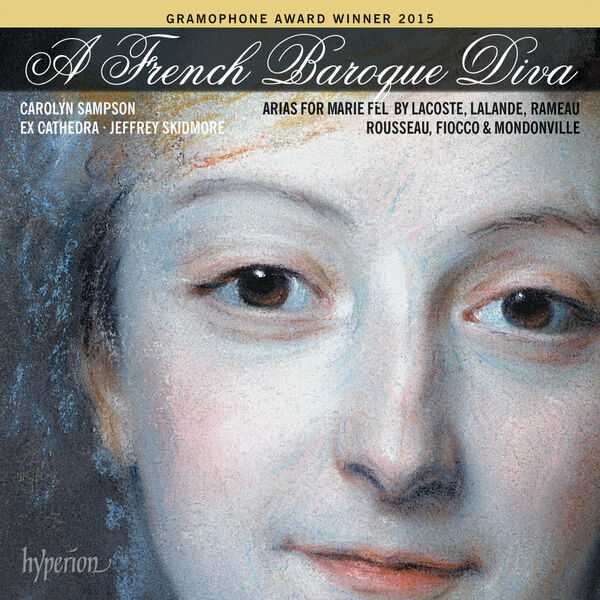

Composer: Joseph Hector Fiocco, Louis Lacoste, Michel-Richard de Lalande, Jean-Joseph Cassanea de Mondonville, Jean Philippe Rameau, Jean-Jacques Rousseau
Performer: Carolyn Sampson, Ex Cathedra
Conductor: Jeffrey Skidmore
Format: FLAC (tracks)
Label: Hyperion
Catalogue: CDA68035
Release: 2014
Size: 1.34 GB
Recovery: +3%
Scan: yes
Lacoste: Philomèle
01. Prologue Scene 1. Ah! quand reviendront nos beaux jours?
Lalande: Exsurgat Deus, S71
02. V. Regna terrae
Lalande: Te Deum laudamus S32
03. I. Sinfonie
04. VIII. Tu rex gloriae
05. IX. Tu ad liberandum suscepturus hominem
Rousseau: Salve regina
06. I. Salve regina, salve mater
07. II. Ad te clamamus, exsules, filii Evae
08. III. O clemens, o pia
Rameau: Castor et Pollux
09. Act 1 Scenes 2-3. Un tendre intérêt vous appelle – Tristes apprêts
Rameau: Platée
10. Act 3 Scene 4. Amour, lance tes traits
Mondonville: Daphnis et Alcimadure
11. Act 1 Scene 2. Gasouillats auzeléts
Fiocco: Laudate pueri
12. I. Laudate pueri
13. III. A solis ortu
14. IV. Alleluia
Mondonville: Venite, exsultemus
15. IV. Venite, adoremus
Rameau: La Lyre Enchantée
16. I. Accordez vos sons et vos pas
17. II. Gavotte: Lyre enchanteresse
18. III. Écoutons … D’un doux frémissement
19. IV. Vole, Amour, prête-moi tes armes
20. V. Contredanse
Lalande: Cantate Domino, S72
21. V. Viderunt omnes termini terrae
Mondonville: Venite, exsultemus
22. VI. Hodie si vocem
Both the music and especially the central figure on this release by British soprano Carolyn Sampson will be largely unfamiliar to most listeners, for the vocal music of the French Baroque has received many fewer contextual studies on recordings than its English and Italian counterparts. Marie Fel was the star singer of mid-18th century Paris, a Bordeaux native who was discovered by an agent of the Paris Opera when she was 20. Roughly as Senesino was to Handel, she was an inspiration to Rameau, and many other composers wrote for her as well. Sampson tries to penetrate Fel’s musicality, and the album is not just a compilation of works associated with her. She sings a sacred aria (Joseph Hector Fiocco’s Laudate pueri, track 12) with the ornamentation Fel herself wrote out, and she even ventures into the Occitan language, which Fel spoke natively, for the extremely unusual Gasouillats auzeléts by Jean-Joseph Cassanéa de Mondonville (track 11). Speakers of Occitan are invited to judge her pronunciation (an English translation is included), but even those with no particular interest in the history of singing will be struck by the variety of Fel’s repertoire, which ranged from the older Lully style of French opera to the bright simplicity of Jean-Jacques Rousseau’s Salve regina of 1752 (not a common item either). Sampson’s voice is not absolutely comfortable when forced to do acrobatics at the top of its range, but for the most part she lives up to d’Aquin’s description of Fel’s instrument as “always lovely, always seductive.” Her range is matched by that of the instrumental group Ex Cathedra under Jeffrey Skidmore, which is called upon to deliver a variety of theatrical effects. Highly recommended.
A welcome return of Carolyn Sampson and Ex Cathedra to Hyperion, performing the rich, fulsome music of the French Baroque. Their recording of love songs from Rameau’s operas (Hyperion CDA67447) was hugely acclaimed for Sampson’s stylish, fluid, seductive performances, and ten years later her artistry is even more dazzling.
This album is of particular interest as rather than concentrating on one composer it showcases the works written for the premiere soprano of the day, Marie Fel. Voltaire called her his ‘adorable nightingale’. For d’Aquin, she was an enchanted being. Marie Fel was the soprano who held an entire generation spellbound at the Paris Opéra and at Louis XV’s court during one of the most glorious periods of French music. With a voice described as ‘pure, charming, silvery’ (La Borde), ‘touching and sublime’ (Grimm) and ‘always lovely, always seductive’ (d’Aquin), she inspired some of Jean-Philippe Rameau’s finest music and introduced a whole new level of virtuosity and expression into the French singing tradition. Her long, triumphant career is traced through this fascinating recording.